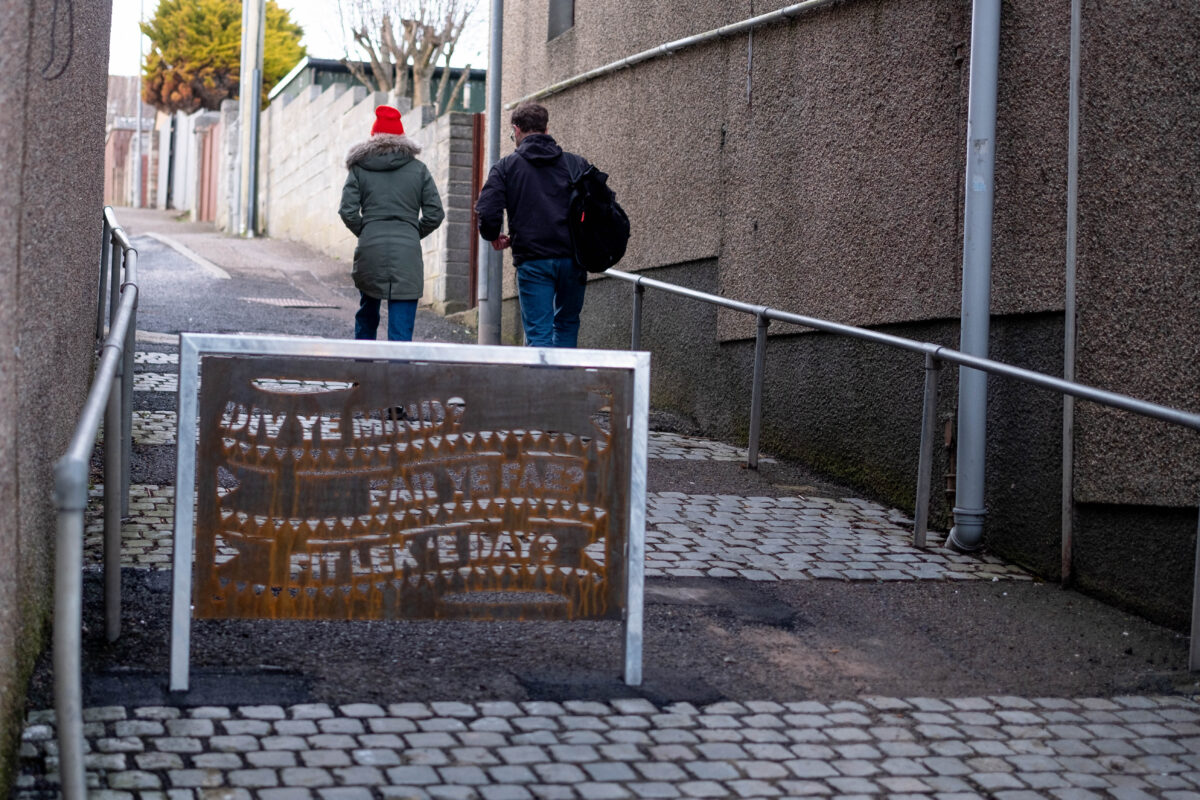Summary
Residents, business owners and school pupils have worked with local artists on the Wick Lanes Pocket Places project which aims to make Wick’s lanes feel safer, easier to navigate, and a better celebration of the town’s unique heritage.
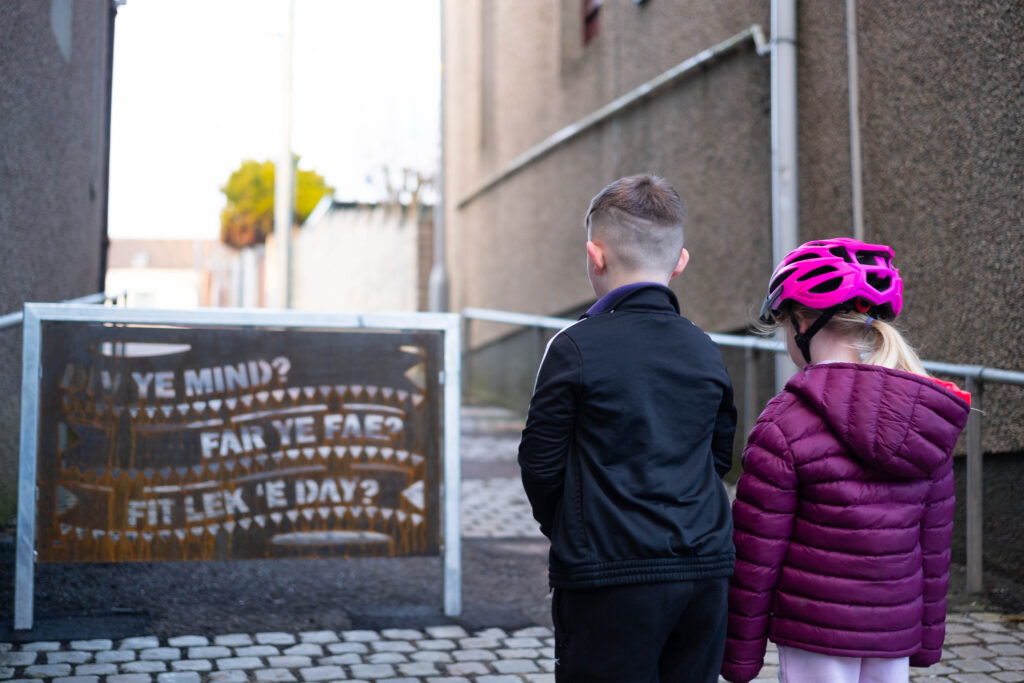
A community has celebrated the installation of a series of durable, long-lasting interventions in their local area.
Among these are five brand-new artworks inspired by Wick’s rich heritage as well as the installation of benches and planters and removal of barriers to increase accessibility and enable more people to stop and enjoy the area.
Royal Burgh of Wick Community Council and The Highland Council successfully applied for Sustrans Scotland’s Pocket Places Programme funding to redesign some of the lanes leading to Wick High Street to make them feel safer, easier to navigate, and a better celebration of Wick’s unique heritage.
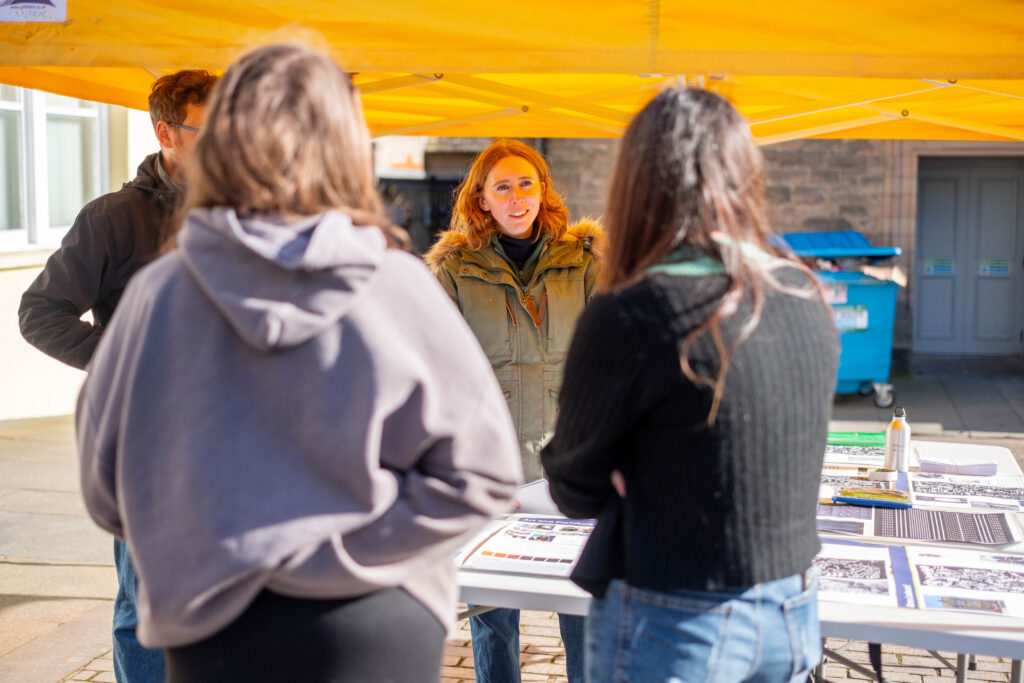
Artworks bring area to life
Sustrans’ collaborative design process puts the people who use the space at the heart of designing solutions to local issues. Throughout the process, the project partners invited local residents, schools, groups and business owners to share their views and aspirations for the lanes at a series of engagement activities to ensure that the design meets the needs of those who use it the most.
In response to suggestions during early community engagement for heritage-inspired public artworks in the lanes, the project partners collaborated with Wick Society and commissioned local artists Hannah Cambridge and Aimee Lockwood to create five new artworks inspired by the town’s history and heritage. The artists conducted workshops to gather input from the community and local schools on specific elements from the Johnston Collection, held in trust by The Wick Society, and Wick’s built heritage.
Artworks in focus
Informed by this community collaboration, the artists translated these elements into exciting designs which are now on display. The artworks have been plasma-cut from weathering steel, a robust and long-lasting material that will stand as lasting testament to Wick’s rich heritage and long history.
Also known as COR-TEN steel, this architectural steel alloy is engineered to provide its own protection from the elements with an innovative formulation that weathers on the outside while the overall structure is protected. This layer of oxidation will age over the years for a distinctive look.
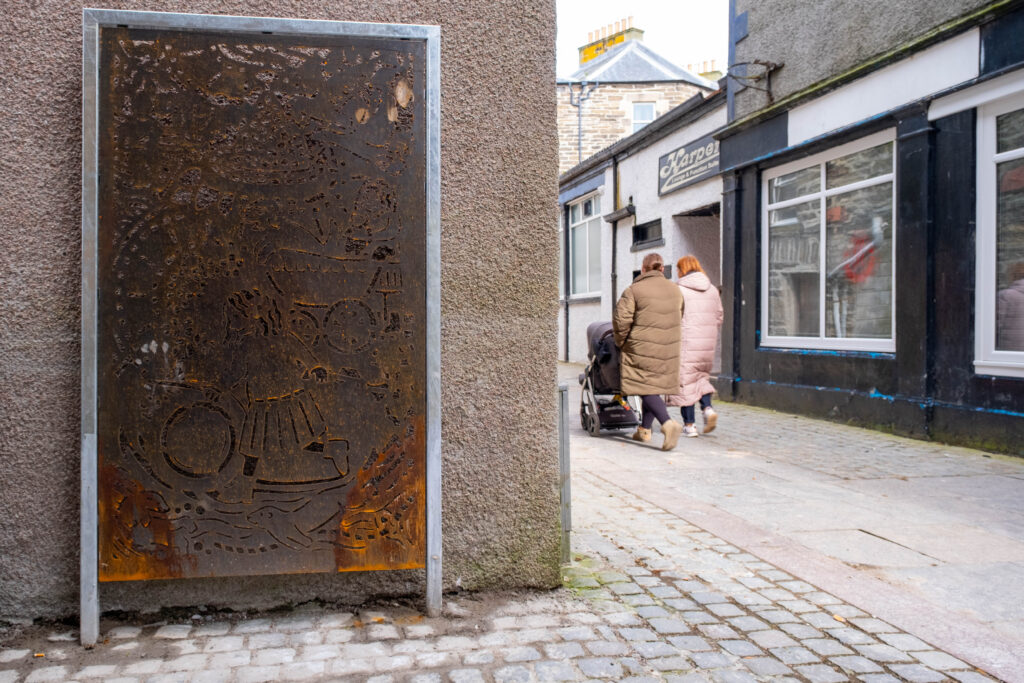
Installed on Wares Lane, this artwork by Aimee Lockwood celebrates the fountain by the riverside. Aimee said: “The fountain by the riverside was commissioned by the Wares family, who were tailors based on Wares Lane, so I liked the connection there!
“The riverside felt like a good place to showcase young people playing as it’s where the playpark is today, and I’ve included some natural elements because the wildlife is the star of the show in Caithness.”
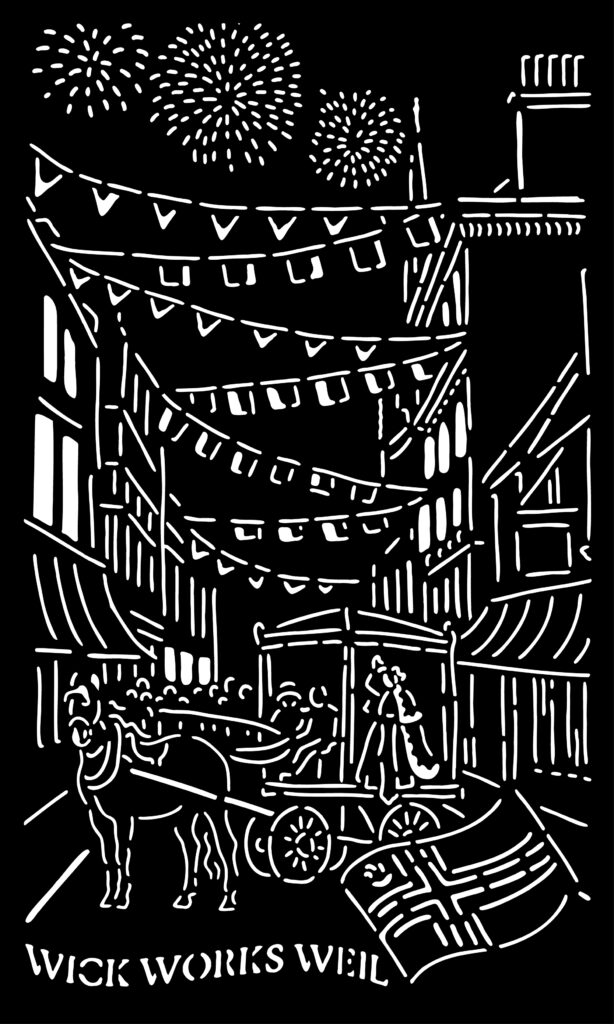
Also installed on Wares Lane is a work by Hannah Cambridge and inspired by the traditional Herring Queen celebration. Hannah explained: “The celebration attracted up to 8,000 spectators in its heyday, was initiated in 1937 by a committee in Wick, aiming to lift spirits during a period of poor fishing.
“The Queen, chosen from those with herring industry ties, was crowned at Braehead and embarked upon a procession through the town and out to sea. The copper crown, symbolising Wick’s maritime history, featured the Ensign Armorial of Wick. After a hiatus from 1939 to 1949, the tradition continued until 1953, coinciding with the decline of herring fishing. The event evolved into the Gala Queen, a July procession that continues to this day.”
Elsewere on Wares Lane, decorative panels inspired by local knitting traditions will be installed to help improve refuse storage for local businesses.
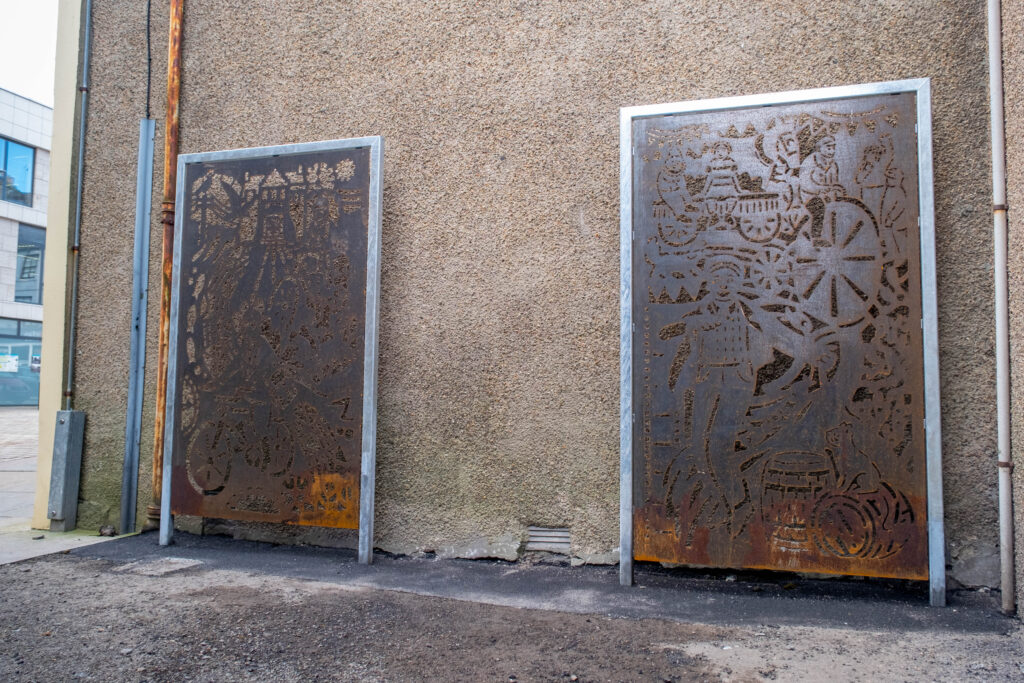
Two brand-new works by Aimee Lockwood have been installed on Market Lane where it joins with Market Square. The first makes a visual connection to the Alexander Bain pub.
Aimee explained: “The Alexander Bain pub was a post and telegram office so I’ve focused on that, with the bicycle messengers and including visual nods to the postal service and telegraph wires. I’ve also included some clocks and watchmaking imagery to reference Alexander Bain’s work as an inventor, as well as the watchmakers who used to work in the area.”
On the other artwork installed on Market Lane, Aimee said: “I wanted this one to be all about fun, so I’ve centred the playful leaping man and included some of the other entertaining characters from the Johnston Collection (there are so many photos of people dressed as clowns!)
“I also wanted to nod to the barrel and rope making industries (next to the pub feels fitting for the barrels) and included some seaweed for a bit of natural texture.”
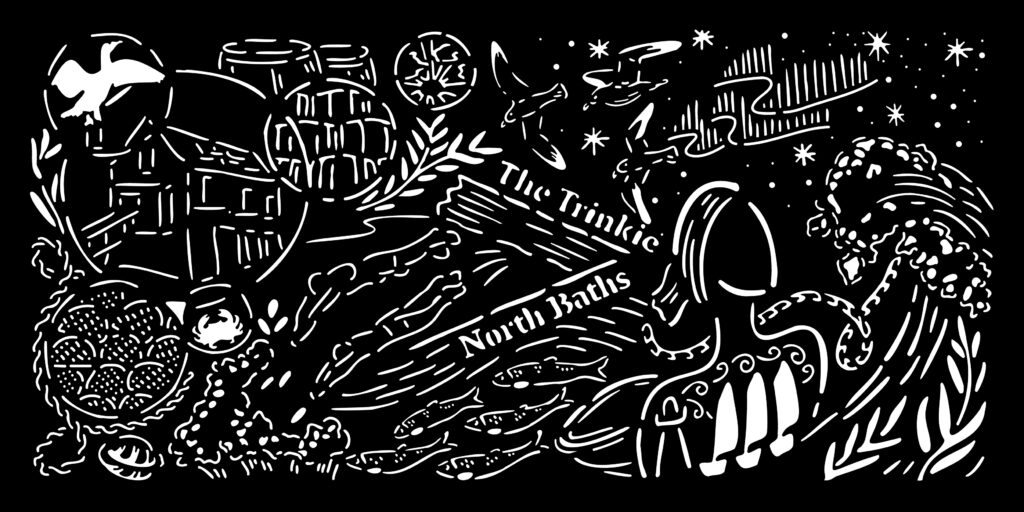
This original artwork by Hannah Cambridge has been installed at the bottom of Market Lane on Market Street.
Hannah said: “Inspired by the ocean and its impact on the culture and people of Wick, this work weaves together coastal landmarks, natural elements (the Northern Lights, the night sky, local wildlife, sea foam, and sunlight filtering through clouds), nods to traditional trades such as barrel and rope making, and the enduring legacy of the herring trade.”
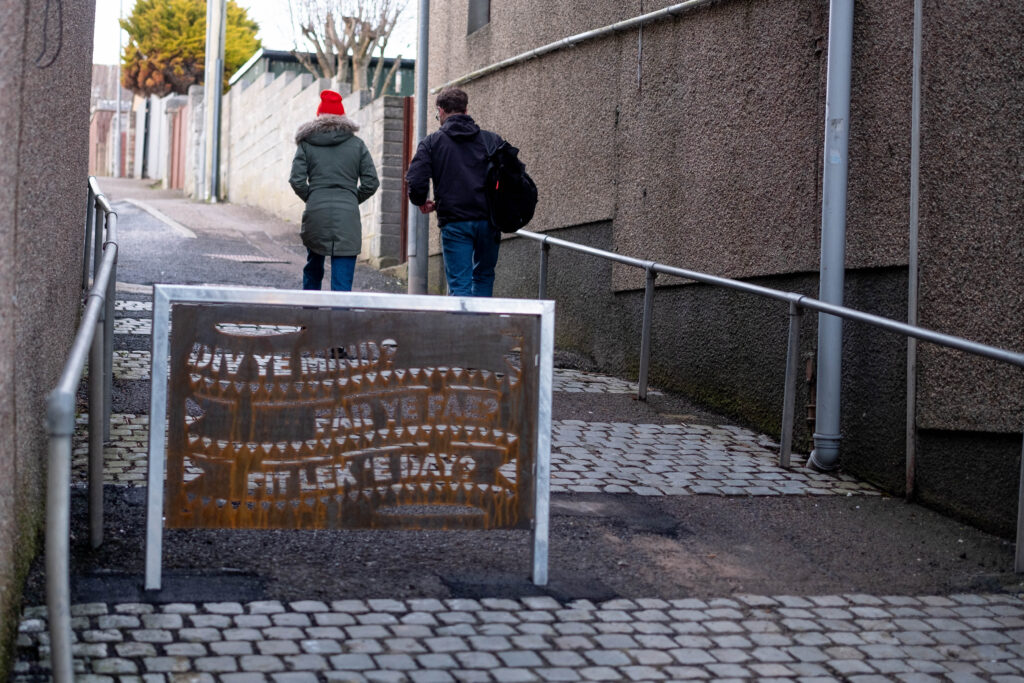
Also on John Street, the existing metal barriers have been removed and replaced with a decorative metal barrier featuring phrases in the Caithness dialect to improve accessibility for people using wheelchairs, mobility scooters and with buggies.
On Tolbooth Lane, a bench has been installed to provide a place for people to stop and and rest on the way up the hill.
How was the project delivered?
Wick Lanes Pocket Places began with a Co-Discover event in August 2023. The project partners worked with schools, groups and the wider community in Wick to identify barriers and opportunities to feed into design ideas for the lanes. People could share their ideas by completing a survey and/or joining an event.
Then, in November 2023, during the Co-Design phase and after analysing all the feedback we collected in the Co-Discover phase, the project partners brought this all together in a series of design ideas for the lanes. In November, these designs were brought back to the community and local access groups to see what worked and what needed to be changed. At this point, the community was invited to take part in workshops with the Wick Society and artists Hannah Cambridge and Aimee Lockwood to collaboratively create the heritage-themed artworks.
The brand-new artworks, as well as the final designs for the lanes were shown to the community in January 2024. And in March 2024, during the Co-Deliver phase, the project was installed and the community invited to an event to celebrate its conclusion.
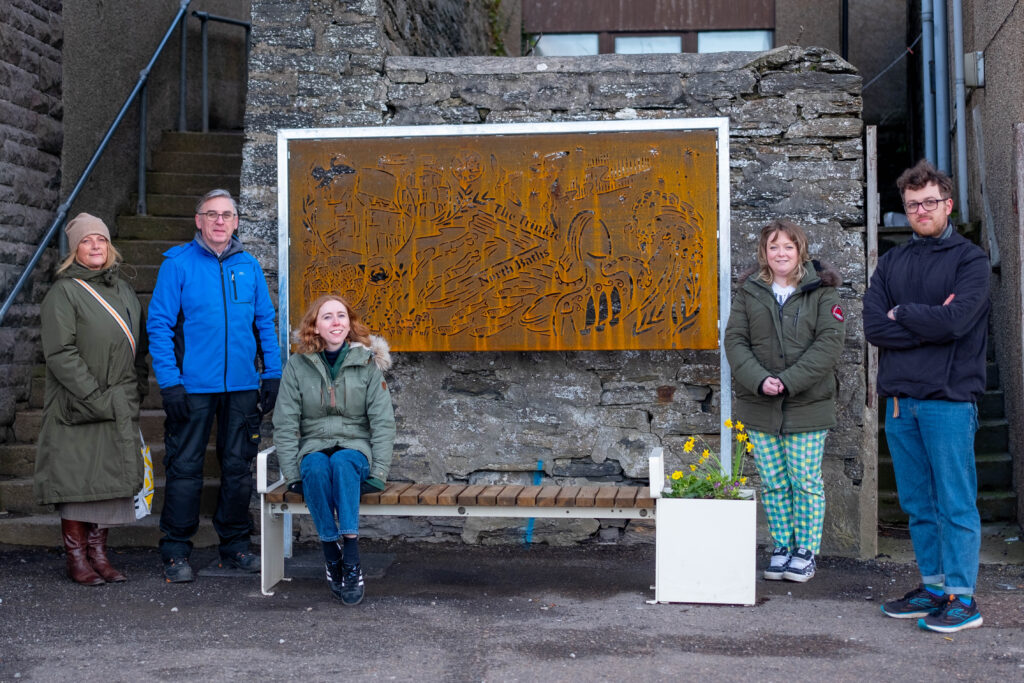
Marion Eele, Project Lead, Co-Design, Sustrans Scotland:
“We are thrilled to see work complete on this exciting project delivered in partnership with the local community, Royal Burgh of Wick Community Council and The Highland Council.
“From the beginning of this project, the community told us they wanted to make the lanes feel safer, more inviting and accessible, as well as to see their heritage and historic character strengthened.
“The changes brought about by the local community will enable residents and visitors to the area to enjoy calm and vibrant spaces while celebrating the town’s rich heritage.
“Seeing the interventions come to life highlights the value of putting people at the heart of decisions on their local spaces.”
Project Lead Marion Eele
Cllr Richard Bremner, Highland Council Leader and Wick Ward Councillor
“This initiative is a small project that will help brighten the lane areas of the town. The funding for this is ring-fenced and, as such, will go to areas that bid to secure it. If we don’t bid, it will go somewhere else. It’s nice to see this project completed. Local folks were engaged from the start, engaging people who live and run businesses in Wick at the heart of the design-process.
“I would like to sincerely thank everyone who has been involved, from coming to the first concept meetings, to taking part in the series of interactive workshops and consultation events. Their input has been key in the whole design process.
“The historic centre of our town will be made a more inviting and appealing place in a small way. It will improve the historic and heritage character of the lanes.”
Highland Council Leader and Wick Ward Councillor Richard Bremner
Allan Farquhar, Chair, Royal Burgh of Wick Community Council:
“Royal Burgh of Wick Community Council are delighted to partner with Highland Council and Sustrans in this initiative which will provide a starting point for the regeneration of our town centre.
“A phased transformation of the Lanes with anticipated spin off to other areas utilising street furniture, artworks and lighting designs sympathetic to our rich heritage and culture complement other development initiatives currently in planning stages by both Highland Council and local community groups.”
Royal Burgh of Wick Community Council Chair Allan Farquhar
Wick Lanes Pocket Places is supported by funding from the Scottish Government through Sustrans Scotland’s Pocket Places programme and delivered in partnership with The Highland Council and Royal Burgh of Wick Community Council.
